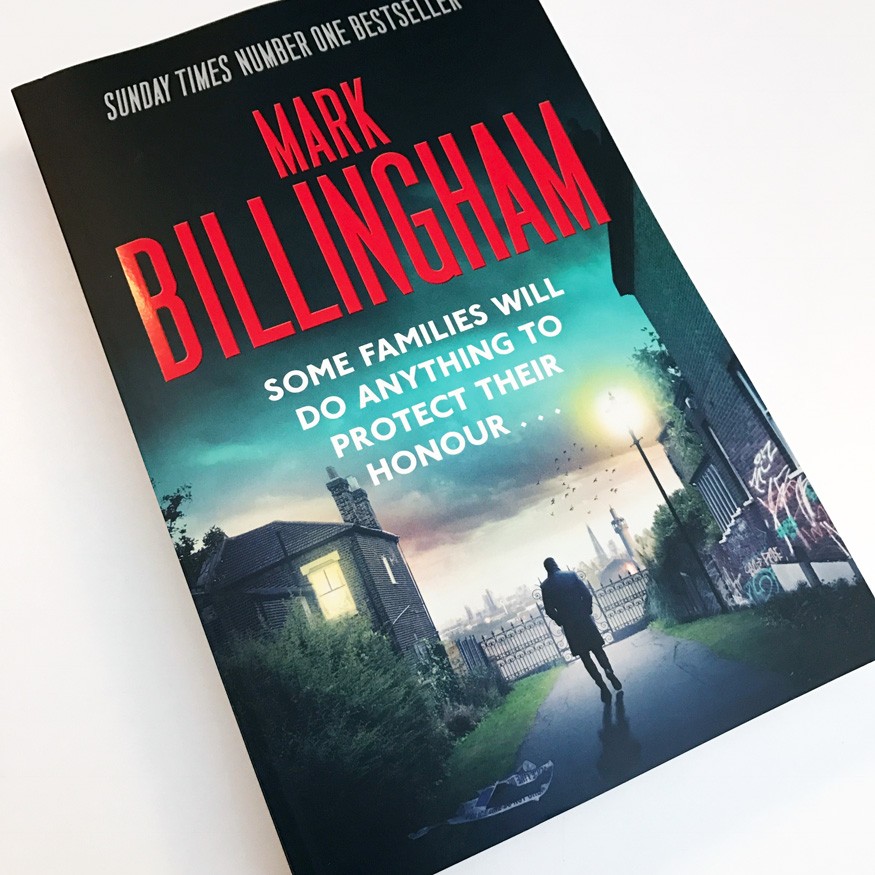
DI Nicola Tanner is investigating a series of organised murders when her own partner, Susan, is brutally killed as well. It makes you wonder: was she getting close to the perpetrators, or was Susan’s death a coincidence? Tanner is bereft and needs answers. She asks Thorne to take over pursuit of the killers and the person who’s handing them contracts. These are honour killings – somebody is serving the families who would do this to their daughters, in a particularly bloody way…
Set in London, the book highlights a very real and topical form of murder. Why has Mark Billingham chosen to write it? A hand-signed, three-page letter from the author arrived with our early copy, and we bring you the text of that letter below.
Why I Wrote Love Like Blood
The murder of 19-year-old Banaz Mahmod in 2006 was one of the most shocking I have ever read about. That she was killed simply because she fell in love with the wrong man is terrible enough, but the fact that her killing – which followed a horrific ordeal of rape and torture – was organised and paid for by her father and uncle, that hitmen were employed to carry it out and other family members helped dispose of the body, make it perhaps the most gruesome and disturbing example of honour killing this country has ever known.
Known…
In the context of this and similar terrible crimes, this is a hugely important word, because fear of reprisals means that honour-based violence remains notably under-reported. Though there are approximately a dozen killings recorded each year, the police and the Crown Prosecution Service accepts that the figure is significantly higher and that annually the number of offences overall, including assault, mutilation, kidnap and acid attacks, cold be close to 20,000.
Perhaps a more pertinent question would be ‘why would I not want to write about this subject?’
‘How could I not?’
Writing about cultures and religions that are not your own brings with it a degree of responsibility, and so it should. I have endeavoured to do so with care, sensitivity and, crucially, with respect. In Love Like Blood I have tried to display the utmost respect for Islam, Hinduism, Sikhism and for those who practice their religions peacefully. Enshrined in each of these religions and their respective scriptures is the simple commandment ‘do no harm unto others’ and it is therefore self-evident that those who carry out these repugnant crimes do not do so with the blessing of any faith. I have nothing but respect for the religions such people profess to practice, but not one iota of anything like respect for them.
While there will always be those who make the mistake of equating these crimes with certain religions, the simple fact is that they are murders like any other. In Love Like Blood, Tom Thorne is trying to bring killers to book and to achieve justice for their victims.
No more than that.
The research that a crime writer sometimes finds necessary can often be disturbing, and this has never been truer for me than it was with this book. I can honestly say that I have never felt angrier writing a book and though this simple human reaction to horror and cruelty occasionally made the work difficult, I now believe that the book is much the better for it.
I also believe, strongly, that this is the kind of book I should be writing.
The drum is often banged (and I’ve done plenty of it myself) for the genre I am proud to be part of. We talk about how crime writers are now writing social novels, that the crime novel is ‘uniquely placed’ to look at the world and to reflect it through the crimes people commit. We tell you a good story, yes, but we can also shine a light into some of the darker corners of society and comment on political and social issues.
I still believe that, but there is only so long we can say such things while we turn out novel after novel about patterned serial killers, when the truth is there are not too many of them running around. There are many great writers, of course, who are writing social crime novels and with Love Like Blood I simply felt it was my turn to step up and write about something very real and very shocking.
I have always said that any writer who sets out with an agenda will write a bad book and I hold to that. Yes, the book is about the hunt for those who carry out honour killings, but as always I have simply tried to tell an entertaining story about believable characters with which the reader will engage. Love like Blood is a straight-down-the-middle crime novel and contains more shocks and twists than almost anything I’ve written before, but it also contains more passion and was written with a fury at brutality and injustice that I have not felt for a long time.
I am enormously proud of it.
When Banaz Mahmod was killed, Rahmat Sulemani, the young man she had chosen to spend her life with said, “She was my present, my future, my hope. She was the best thing that ever happened to me. My life went away when Banaz died. There is no life.”
In May 2016, while I was writing this book, almost a decade after the woman he loved was murdered, Rahmat Sulemani hanged himself. Though he was alive when police officers found him, he died in hospital five days later.
“There is no life…”
Mark Billingham, February 2017
Watch for our review in due course. You can pre-order a copy below, and see more images of the book and its cover.